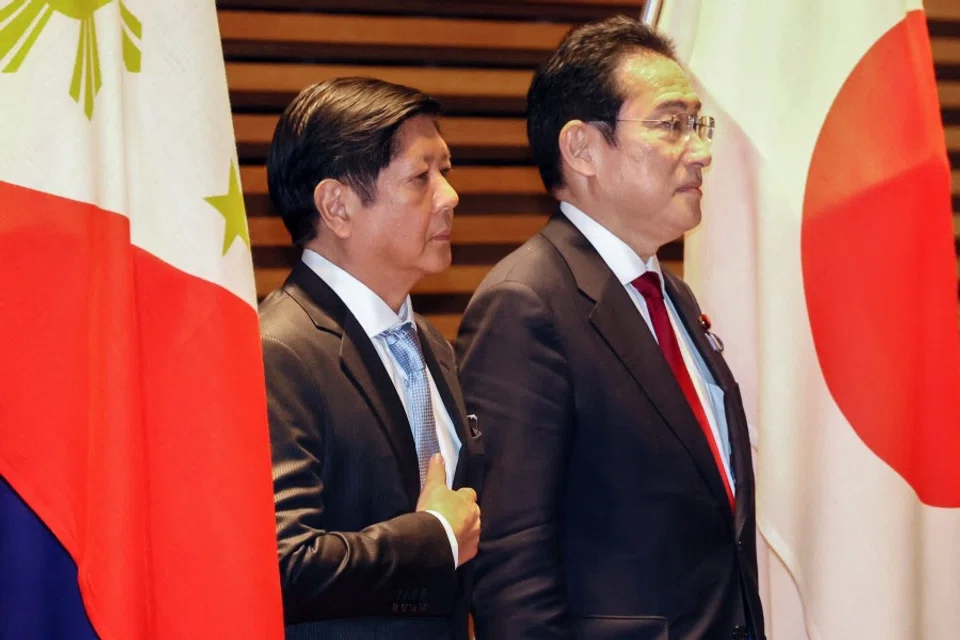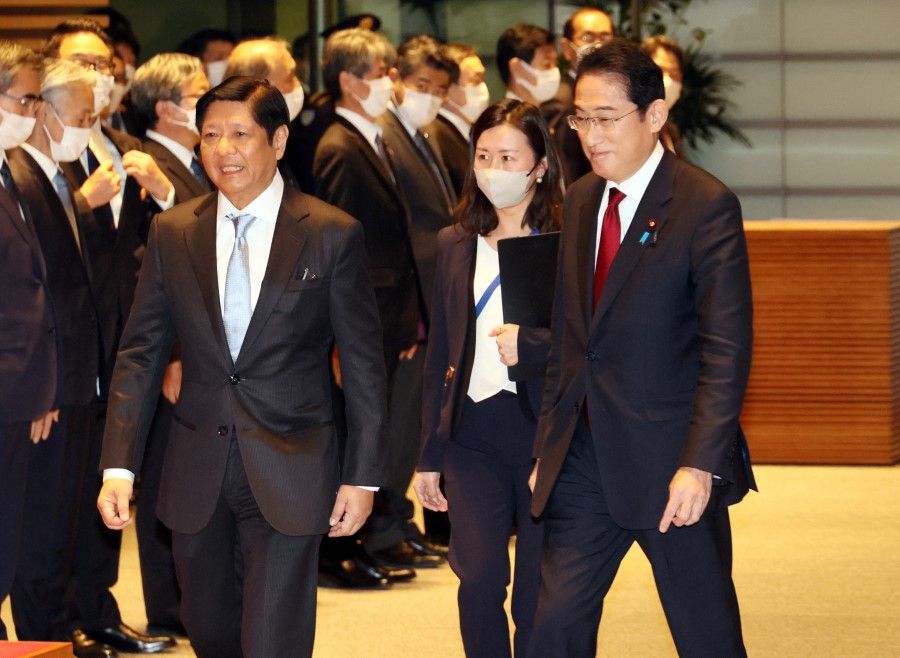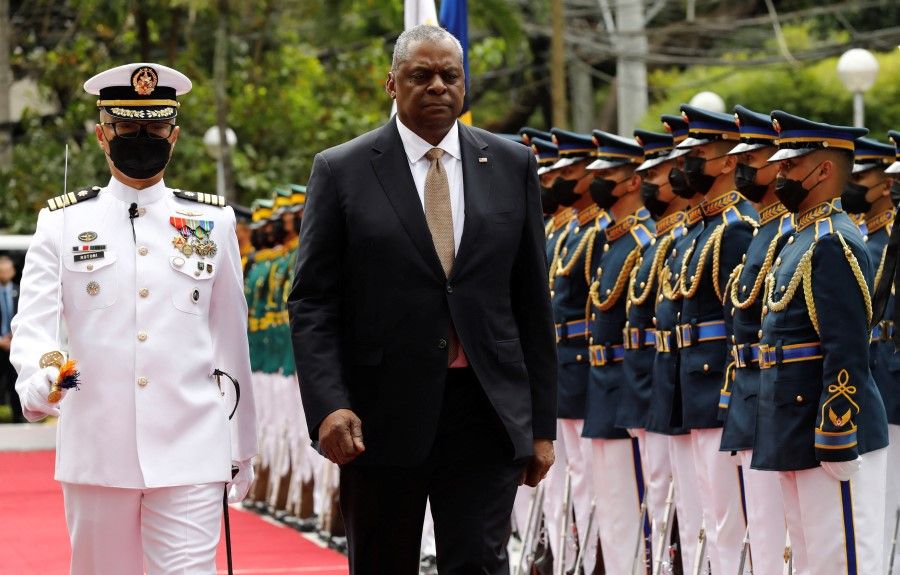Closer trilateral US-Japan-Philippines ties to protect security interests against China

During his recent visit to Japan, Philippine President Ferdinand Marcos Jr had a summit meeting with Prime Minister Fumio Kishida on 9 February. The main focus of the meeting was on how to respond to China, which has been changing the status quo by force in the waters of East Asia, in violation of the rules-based international order.
In the South China Sea, China has ignored the 2016 arbitration award, which recognises jurisdiction claimed by the Philippines, and instead has continuously undermined the security of the Philippines, including taking control of Scarborough Shoal, claimed by the Philippines, using China Coast Guard (CCG) ships. In the East China Sea, China has unilaterally claimed the Senkaku Islands, which Japan sees as its inherent territory. Not only have CCG ships repeatedly invaded Japan's territorial waters, but People's Liberation Army (PLA) warships and aircraft have also stepped up their activities, threatening Japan's security.
China a common security threat
Faced with this situation, President Marcos and Prime Minister Kishida issued a joint statement stating that they both agreed on the importance of a "free and open international order based on the rule of law" as well as the fundamental principles in the Free and Open Indo-Pacific (FOIP) promoted by Japan and the ASEAN Outlook on the Indo-Pacific (AOIP) put forth by ASEAN.
The two national leaders expressed "serious concern" about the situation in the East and South China Seas and stressed that they "strongly opposed the actions including force or coercion that may increase tensions". They also agreed that they were opposed to "militarization, coercive activities and threats or the use of force in the South China Sea".
This Japan and Philippines summit meeting will likely open up the path towards enhancing trilateral cooperation between Japan, the Philippines and the US...

Japan and the Philippines agreed to pursue concrete security cooperation to enhance the free and open maritime order based on rules.
As regards strengthening the ties between the Japan Self-Defense Forces (JSDF) and the Armed Forces of the Philippines (AFP), the procedures for visits to the Philippines by the JSDF for humanitarian assistance and disaster relief activities will be simplified. The two sides will also work towards an agreement to facilitate visits for education and training exchanges between the JSDF and the AFP.
Furthermore, Japan will provide personnel training for Japanese air-surveillance radar systems in the Philippines, and will consider transferring more defence equipment and technology to the Philippines.
With regard to maritime security cooperation, they affirmed the results of the Japanese's provision of patrol boats, and the education and training of the Philippine Coast Guard (PCG) personnel. Japan will also support the development of the PCG's base in Subic Bay and provide a satellite communication system for the patrol boats.
Moreover, for the Sulu and Celebes seas, where warships of the PLA Navy are increasingly becoming active, both Japan and the Philippines affirmed the importance of working together to develop capacity for maritime domain awareness (MDA) and strengthen maritime law enforcement based on the United Nations Convention on the Law of the Sea (UNCLOS).
Enhancing trilateral security cooperation
This Japan and Philippines summit meeting will likely open up the path towards enhancing trilateral cooperation between Japan, the Philippines and the US, who all aim to deter China from trying to change the status quo at sea. Japan and the Philippines are both US allies and are integral to the US military's operations in East Asia. At the same time, Japan and the Philippines need to bolster their cooperation with the US military to counter Chinese military pressure. In December 2022, Japan revised its National Security Strategy and decided to extend cooperation with the US military while also drastically strengthening Japan's defence capabilities.

The Marcos administration has also announced a policy of working more closely with the US military, and when US Defence Secretary Lloyd Austin visited the Philippines in February, they agreed to increase the number of bases available to US forces under the Enhanced Defense Cooperation Agreement (EDCA) from five to nine.
At this summit meeting, Japan and the Philippines indicated their intention to further strengthen trilateral cooperation through the implementation of trilateral talks with the US and the participation of the SDF in training conducted by the US and the Philippines.
Strengthening security cooperation between Japan, the Philippines and the US will deter China's force-based moves to change the status quo in the East China Sea, the South China Sea and the Taiwan Strait.
Taiwan Strait
Strengthening security cooperation between Japan, the Philippines, and the US, is becoming increasingly important in maintaining peace and stability in the Taiwan Strait. Japan and the Philippines are located to the north and the south of Taiwan, respectively, and together they make up the "first island chain".
The PRC has also stepped up military pressure on Taiwan, as evidenced by the PLA's large-scale military exercises around Taiwan in August 2022. Strengthening security cooperation between Japan, the Philippines and the US will deter China's force-based moves to change the status quo in the East China Sea, the South China Sea and the Taiwan Strait.
The Marcos administration attaches importance to dialogue with China to stabilise relations as well as recognises the importance of security cooperation with the US and Japan to protect its own security and facilitate effective dialogue with China. For the US and Japan, which are aiming to realise the FOIP, further strengthening their relationship with the Philippines is also an important task.
Related: While preserving good relations with China, the Philippines must exercise its maritime rights | Japan's weapons transfers to Southeast Asia: Opportunities and challenges | Philippine-US cooperation on Whitsun Reef: A 'win' for the Biden team in Southeast Asia? | US defence chief Lloyd Austin in Southeast Asia: Did the US strike the right notes?
